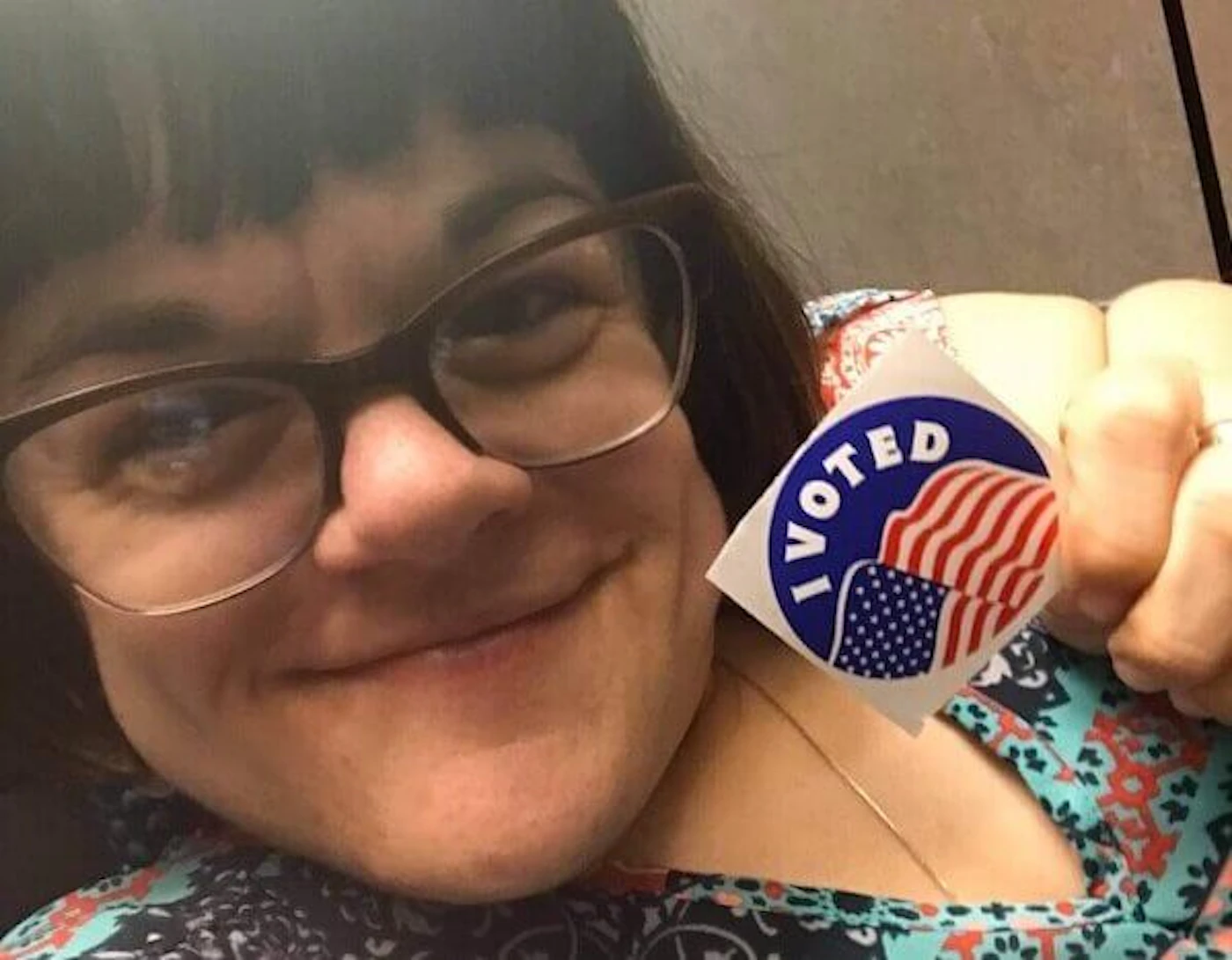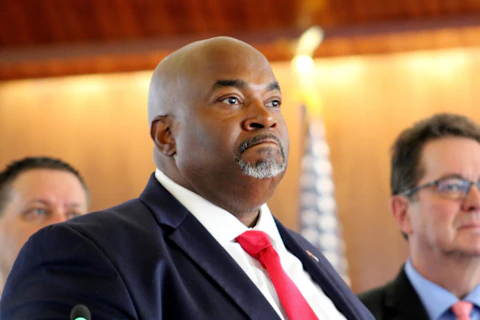Republican lawmakers are trying to make it more difficult to cast absentee ballots, a method voters with disabilities rely on for safety and convenience.
Stephanie Birmingham of Sturgeon Bay put herself in harm’s way to cast a ballot in spring of 2019.
Snow and ice hadn’t yet been cleared from the sidewalks, making it a challenge for Birmingham to navigate a motorized wheelchair to her polling place. At the time, she wasn’t aware she could request an absentee ballot, but was determined to cast her vote.
So Birmingham had to drive her motorized wheelchair down city streets to drop off her ballot in person, avoiding passing cars and potholes along the way. She made it home safely, and today, Birmingham works as an advocacy coordinator for Options for Independent Living, one of eight independent living centers in Wisconsin, where she supports others with disabilities.
But she’s worried about a series of voting bills put forward by Republican lawmakers, the barriers they would pose to voters with disabilities, and the lengths voters would have to go to participate in democracy should the bills become law.
“These bills that have been working their way through the Legislature are going to impact a whole section of the population that historically has faced barriers to voting,” Birmingham said, adding, “Think about disenfranchising a segment of the population that has already struggled to engage in the democratic process.”
The proposals, which would broadly make absentee voting more difficult, are in line with legislation that’s moved forward in other battleground states with Republican-majority legislatures, said Barry Burden, political science professor at the University of Wisconsin–Madison and director of the Elections Research Center. Similar bills advanced in Florida, Georgia, and Arizona.
“The bills we’re seeing in Wisconsin and other battleground states are really just an immediate reaction to legislators’ discontent with what happened in 2020,” said Burden. “Its roots are in Donald Trump’s complaints about absentee voting. He railed for about a year, consistently and publicly, in speeches and on Twitter, about what he believed was fraud happening with mail-in voting,” he added.
Burden said Trump’s baseless allegations sowed doubts about the integrity of elections—despite the fact that Trump’s own “government declared the 2020 election was one of the most secure and transparent in American history”— and fanned the very distrust that Republican lawmakers have since seized on.
“It becomes a kind of circular echo chamber, where some politicians are saying we need to do something about the election laws because the public is distrusting of the system. But the reason the public is distrusting of the system is because those politicians are saying you can’t trust it,” he said.
RELATED: Wisconsin GOP Lawmakers Have Introduced 11 Restrictive Voting Bills, Analysis Finds
Some of the Wisconsin bills would limit the number of drop boxes for municipalities; require that absentee ballots be dropped off only by a member of the voter’s family, a legal guardian, or a person designated in writing; and make it a felony for nursing or care facility staff to “influence” a resident to apply or not apply for an absentee ballot. That bill, however, is written so broadly that advocates worry it could conflate influence with assistance—and make nursing homes or care facilities unwilling to assist residents in any way out of fear of prosecution.
One bill, introduced by Sen. Duey Stroebel (R-Saukville) would add new hurdles for homebound voters hoping to cast absentee ballots, requiring them to provide a photo ID and apply each year for an absentee ballot instead of having one automatically sent to them.
It would also require a note from a doctor for anyone younger than 65 who claims to be “indefinitely confined,” due to age, illness or disability. An outbreak or epidemic does not qualify the voter for indefinitely confined status, under the bill. And it levels the threat of a felony—punishable by a fine of up to $10,000 or 3.5 years in prison—against anyone who makes false statements about their indefinitely confined status.
The number of indefinitely confined voters rose considerably in the leadup to the 2020 election, an increase likely related to the pandemic.
Stroebel said the bill would protect election integrity by ensuring that requirements for absentee voting match requirements for in-person voting.
“We require voters to show an ID when they cast a ballot at the polls on Election Day, and that’s
the same process we should require for all absentee voters,” Stroebel said. “We must ensure that we have a voting mechanism in place that allows truly indefinitely confined citizens to participate in elections and this bill does just that,” he added.
But Burden pointed out the stated concerns over election integrity don’t match the timeline of Republican efforts to examine the election.
Underway are two separate investigations into the 2020 election—one by the Legislative Audit Bureau, and another commissioned by Assembly Speaker Robin Vos (R-Rochester), who is awarding retired police officers at least $20,000—funded by taxpayers—to dig into the election results. Neither investigation has concluded.
“It’s as if the results of the audit bureau and the police investigation don’t matter if the results come after these bills are being sent to the governor. It’s a strange order,” Burden said.
Kyle Kleist, a Menomonie resident and executive director of the the Center for Independent Living for Western Wisconsin, believes the proposed restrictions are illogical. And they overlook the concrete hurdles they would impose for voters with disabilities.

“Some of these restrictions just don’t make sense, to be honest. And they’re based on a lot of falsehoods,” Kleist said.
He worries that doctors asked to testify to voter’s status as indefinitely confined may be influenced by their own political leanings. And it puts the burden of finding wheelchair-accessible transportation to a doctor’s office or DMV, onto the shoulders of voters.
“In most rural areas, there’s a real lack of transportation,” Kleist said. “That’s why absentee balloting is so essential for so many individuals with disabilities.”
The last time he voted in person, the polling place had no disabled parking spots available, he said. His wife, who also has a disability, was forced to sit on his lap while they waited in line to vote because no chairs were available and it’s difficult for her to stand for long periods of time.
“It was a nightmare,” Kleist said. He remembers thinking: “‘I’m not going to go through this crap again.’”
“That’s when I started voting absentee,” he said.
Gov. Tony Evers has said that he will veto any bill that makes it more difficult to vote. He already vetoed a bill that would have prevented municipalities from accepting private grants to help run elections. Six other election-related bills have passed the Legislature, but lawmakers have yet to send them to Evers’ desk.
But Kleist said the fact that these bills were introduced at all sends a message to voters with disabilities that lawmakers are willing to ignore their voices.
“A message that I hear a lot from individuals with disabilities is that ‘they’re more than willing to suppress my vote, because they believe I’m going to vote Democrat,’” Kleist said.
He continued, “That’s really what it’s all about. And if it wasn’t for Gov. Evers, these [bills] would have gone through as they have in other states where you have Republican-controlled Senate, Assembly and governor.”





